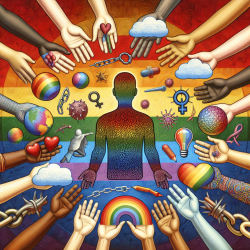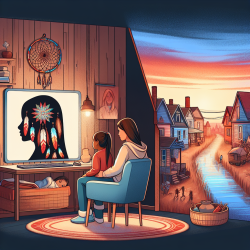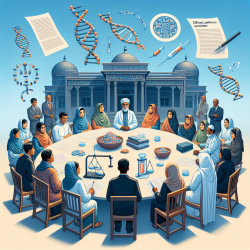Introduction
In the evolving landscape of mental health services (MHS), understanding the unique challenges faced by diverse populations is crucial. A recent study titled "Using an intersectionality-based approach to evaluate mental health services use among gay, bisexual and other men who have sex with men in Montreal, Toronto and Vancouver" sheds light on the complexities of mental health service utilization among gay, bisexual, and other men who have sex with men (GBM) in Canada. This research provides valuable insights that can help practitioners improve their services by considering the intersecting impacts of homonegativity, racism, and HIV stigma on GBM.
Key Findings
The study utilized data from the Engage cohort study, involving 2,371 GBM from Montreal, Toronto, and Vancouver. It highlighted several critical points:
- Discrimination and Mental Health Services (MHS) Use: The study found that perceived discrimination (PD) significantly mediated MHS use among racialized HIV-negative GBM, indicating that higher levels of discrimination were associated with increased use of mental health services.
- Intersectionality Matters: The research emphasized the importance of considering multiple intersecting identities, such as race and HIV status, which uniquely affect the mental health outcomes and service utilization of GBM.
- Racialized GBM and MHS Utilization: Racialized HIV-negative GBM showed higher odds of MHS use due to increased PD levels, suggesting a need for culturally sensitive interventions that address both racial and sexual identity-related stressors.
Implications for Practitioners
For practitioners working with GBM, these findings underscore the necessity of adopting an intersectionality-based approach in mental health services. Here are some strategies to consider:
- Integrate Intersectionality into Practice: Understanding the overlapping systems of discrimination that affect GBM can help tailor interventions that address specific stressors related to race, sexual identity, and HIV status.
- Enhance Cultural Competency: Training programs that focus on cultural competency can equip practitioners with the skills to recognize and address the unique needs of racialized GBM.
- Develop Supportive Environments: Creating safe spaces where GBM feel comfortable discussing their experiences of discrimination can foster better therapeutic outcomes.
Encouraging Further Research
While this study provides valuable insights, it also highlights the need for further research to explore the nuances of intersectionality in mental health service utilization. Future studies could focus on:
- Longitudinal Studies: Examining the long-term effects of discrimination on mental health outcomes among GBM.
- Broader Sample Diversity: Including a wider range of ethnicities and geographical locations to better understand the diverse experiences of GBM across Canada.
- Intervention Efficacy: Assessing the effectiveness of intersectionality-based interventions in improving mental health outcomes for GBM.
To read the original research paper, please follow this link: Using an intersectionality-based approach to evaluate mental health services use among gay, bisexual and other men who have sex with men in Montreal, Toronto and Vancouver.










